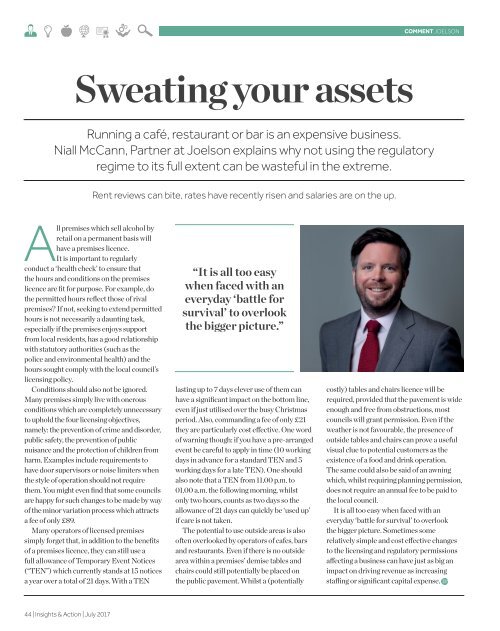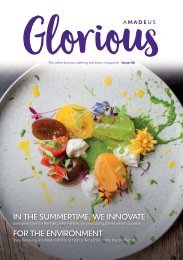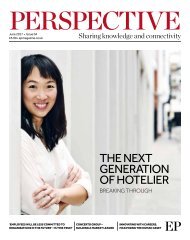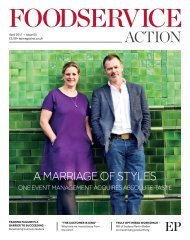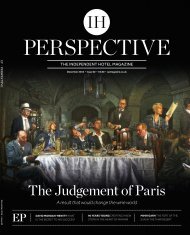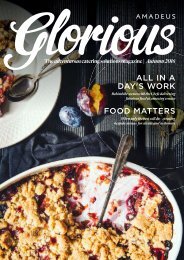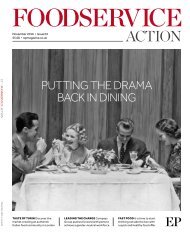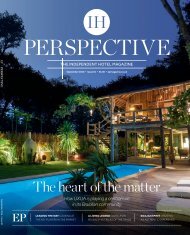EP Insights & Action
Expert observers comment on the Industry. This magazine is designed to bring together the thought leadership, ideas and opinions of leading consultants and operators from across the industry. EP's vision is to create an open narrative and debate that explains the perspective and thinking on the market and Industry. It will help all progress, so let us know your thoughts, subscribe and be involved.
Expert observers comment on the Industry. This magazine is designed to bring together the thought leadership, ideas and opinions of leading consultants and operators from across the industry. EP's vision is to create an open narrative and debate that explains the perspective and thinking on the market and Industry. It will help all progress, so let us know your thoughts, subscribe and be involved.
Create successful ePaper yourself
Turn your PDF publications into a flip-book with our unique Google optimized e-Paper software.
COMMENT JOELSON<br />
Sweating your assets<br />
Running a café, restaurant or bar is an expensive business.<br />
Niall McCann, Partner at Joelson explains why not using the regulatory<br />
regime to its full extent can be wasteful in the extreme.<br />
Rent reviews can bite, rates have recently risen and salaries are on the up.<br />
All premises which sell alcohol by<br />
retail on a permanent basis will<br />
have a premises licence.<br />
It is important to regularly<br />
conduct a ‘health check’ to ensure that<br />
the hours and conditions on the premises<br />
licence are fit for purpose. For example, do<br />
the permitted hours reflect those of rival<br />
premises? If not, seeking to extend permitted<br />
hours is not necessarily a daunting task,<br />
especially if the premises enjoys support<br />
from local residents, has a good relationship<br />
with statutory authorities (such as the<br />
police and environmental health) and the<br />
hours sought comply with the local council’s<br />
licensing policy.<br />
Conditions should also not be ignored.<br />
Many premises simply live with onerous<br />
conditions which are completely unnecessary<br />
to uphold the four licensing objectives,<br />
namely: the prevention of crime and disorder,<br />
public safety, the prevention of public<br />
nuisance and the protection of children from<br />
harm. Examples include requirements to<br />
have door supervisors or noise limiters when<br />
the style of operation should not require<br />
them. You might even find that some councils<br />
are happy for such changes to be made by way<br />
of the minor variation process which attracts<br />
a fee of only £89.<br />
Many operators of licensed premises<br />
simply forget that, in addition to the benefits<br />
of a premises licence, they can still use a<br />
full allowance of Temporary Event Notices<br />
(“TEN”) which currently stands at 15 notices<br />
a year over a total of 21 days. With a TEN<br />
“It is all too easy<br />
when faced with an<br />
everyday ‘battle for<br />
survival’ to overlook<br />
the bigger picture.”<br />
lasting up to 7 days clever use of them can<br />
have a significant impact on the bottom line,<br />
even if just utilised over the busy Christmas<br />
period. Also, commanding a fee of only £21<br />
they are particularly cost effective. One word<br />
of warning though: if you have a pre-arranged<br />
event be careful to apply in time (10 working<br />
days in advance for a standard TEN and 5<br />
working days for a late TEN). One should<br />
also note that a TEN from 11.00 p.m. to<br />
01.00 a.m. the following morning, whilst<br />
only two hours, counts as two days so the<br />
allowance of 21 days can quickly be ‘used up’<br />
if care is not taken.<br />
The potential to use outside areas is also<br />
often overlooked by operators of cafes, bars<br />
and restaurants. Even if there is no outside<br />
area within a premises’ demise tables and<br />
chairs could still potentially be placed on<br />
the public pavement. Whilst a (potentially<br />
costly) tables and chairs licence will be<br />
required, provided that the pavement is wide<br />
enough and free from obstructions, most<br />
councils will grant permission. Even if the<br />
weather is not favourable, the presence of<br />
outside tables and chairs can prove a useful<br />
visual clue to potential customers as the<br />
existence of a food and drink operation.<br />
The same could also be said of an awning<br />
which, whilst requiring planning permission,<br />
does not require an annual fee to be paid to<br />
the local council.<br />
It is all too easy when faced with an<br />
everyday ‘battle for survival’ to overlook<br />
the bigger picture. Sometimes some<br />
relatively simple and cost effective changes<br />
to the licensing and regulatory permissions<br />
affecting a business can have just as big an<br />
impact on driving revenue as increasing<br />
staffing or significant capital expense.<br />
44 | <strong>Insights</strong> & <strong>Action</strong> | July 2017


